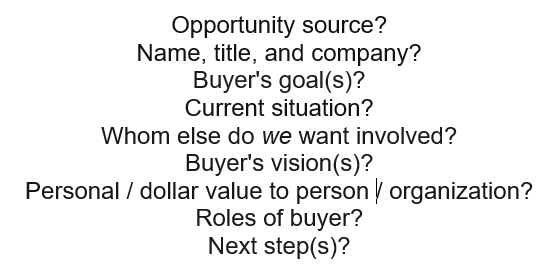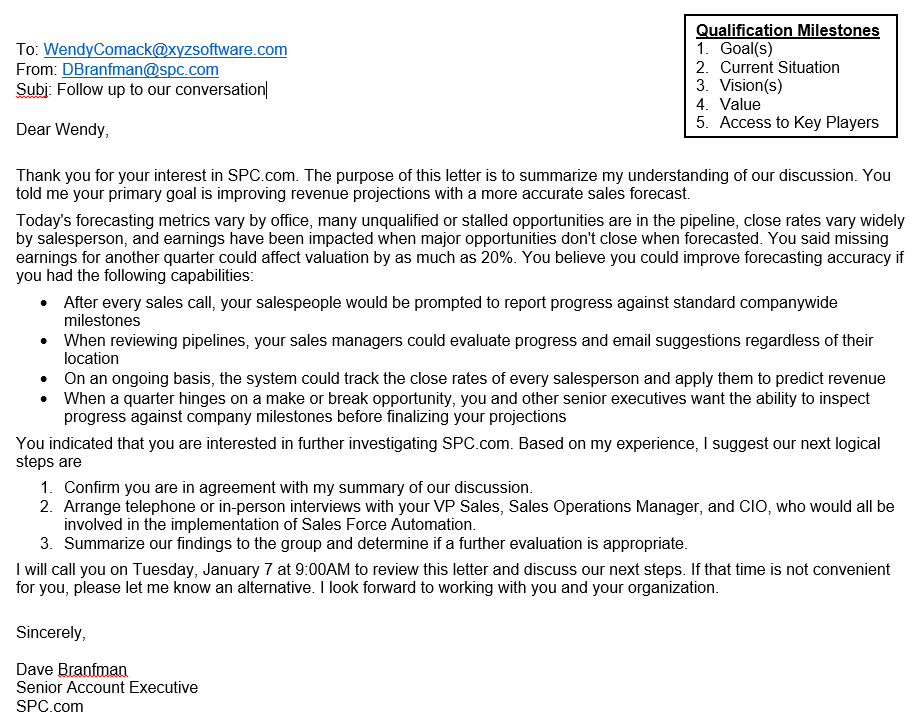Westside Toastmasters is located in Los Angeles and Santa Monica, California
Qualifying a Champion
One key element in the qualification process is to identify and reinforce a Champion. When the salesperson is calling high, the Champion will often be self-nominating. He or she will often volunteer access to Key Players. More often, of course, he or she has to be asked through the kinds of Customer Focused Selling correspondence with buyers. After a call on a potential Champion, the salesperson should be required to answer the debriefing questions in Figure 12-4.
Once the answers to the debriefing questions have been edited and approved, the seller now composes a Champion Letter. The Champion Letter or email serves four important roles:
It provides a sanity check for salespeople to verify that they have articulated the buyer's goal, current situation, and vision.
After sellers demonstrate mastery of this process, sales managers can allow the Champion Letter to be sent without being edited. In such cases, it allows the manager to audit a salesperson's achievement of milestones to see if a prospect is worthy to be in the pipeline. Any process must have an audit trail, and, assuming that salespeople create visions using Solution Formulators, all of the debriefing questions contained in the Champion Letter must be answered.
It serves as a reminder to the buyer of the conversation with the salesperson. Unlike vendor brochures, this letter minimizes the chance of the buyer becoming confused if he or she is evaluating offerings from other companies.
It facilitates internal selling by providing prospect-ready messaging (the words for your Champion to use to explain or defend his or her interest). For this reason, many salespeople prefer to email the Champion Letter on the day of the call, and follow up via physical mail. Our preference is email, which can be forwarded easily to Key Players.
We include a sample Champion Letter in Figure 12-5. We believe that the sales manager should be involved in writing, or at least editing, Champion Letters until he or she is confident that the salesperson can accomplish this without help. Having a half dozen good models in the drawer should build that confidence in both parties.
Take a minute to read the first three paragraphs of our sample letter. Here's where the goals, current situation, vision, and value for the Champion are summarized. (The insert in the upper right-hand corner is not included in a real Champion Letter.) Please note that all answers to the debriefing questions come from executing the Customer Focused Selling process. Traditional salespeople need both a map (milestones) and explicit directions (a defined sales process plus Sales-Primed Communications).
In previous chapters, we've hammered away at the importance of consistency in messaging. What many organizations fail to realize is that a great deal of selling occurs while the salesperson is not present at the prospect organization. How? After a successful sales call, many buyers attempt to share their excitement with other people within the organization. In fact, the better the call, the more likely this is to happen.
But how confident are you that your message will get across accurately? Consider how long it takes a salesperson to become proficient at relating the offerings in a way that makes sense to the many different buyers he or she calls on. Most likely, this is an intensive, full-time effort over several months. How well prepared is a buyer who spent 45 minutes with a salesperson to recreate the excitement the buyer felt about a vision of using the offering to finally achieve a goal or solve a problem?
Take an example from everyday life. You attend a professional meeting, and the after-dinner attraction is an inspirational speaker (who most likely has practiced and delivered this same talk many, many times over the previous months or years). You are carried away by the speaker and the subject, and—on returning home—you attempt to convey your excitement to your spouse. Hard to do, right? Most likely, it's one of those "you had to be there" situations, and you may find that your enthusiasm is now muted. Maybe that speaker wasn't that good, after all. . . .
So messaging is important in your correspondence from the very first encounter with a potential Champion. Give the Champion the scripts he or she needs in order to serve as your surrogate.
Now look at the fourth paragraph of our sample letter, which begins, "You indicated that you are interested. . . ." One of the trickier and more important building blocks of the Champion Letter comes toward the end, where the salesperson attempts to shape the further investigation of the opportunity. This is where the salesperson attempts to get the Champion to agree to provide the salesperson with access to Key Players. Which Key Players? The titles will vary, depending on the complexity of the offering, how many people will be affected during the implementation, the size of the proposed expenditure, and the size of the target organization. Another variable may be the state of the economy. During difficult financial conditions, even add-on business with existing customers may require more sign-offs, and at higher levels, than previous orders. A rule of thumb is to review your Targeted Conversations List.
For these reasons, the sales manager should be involved in these decisions, at least until the salesperson has demonstrated the ability to make these kinds of determinations. The sales manager should not hesitate to get reinvolved in these decisions if circumstances change, either on the seller's end or on the buyer's end.
This approach—requesting access to Key Players in the Champion Letter—relieves the seller of the burden of having to request access during a call. At the same time, though, it ensures that this critical step is actually taken. Some traditional salespeople are primarily concerned about getting and keeping opportunities in their pipelines, and are therefore hesitant to ask tough qualification questions. This isn't acceptable: An opportunity isn't real until access to the entire buying committee has been granted and documented, which leads us to the next step.





